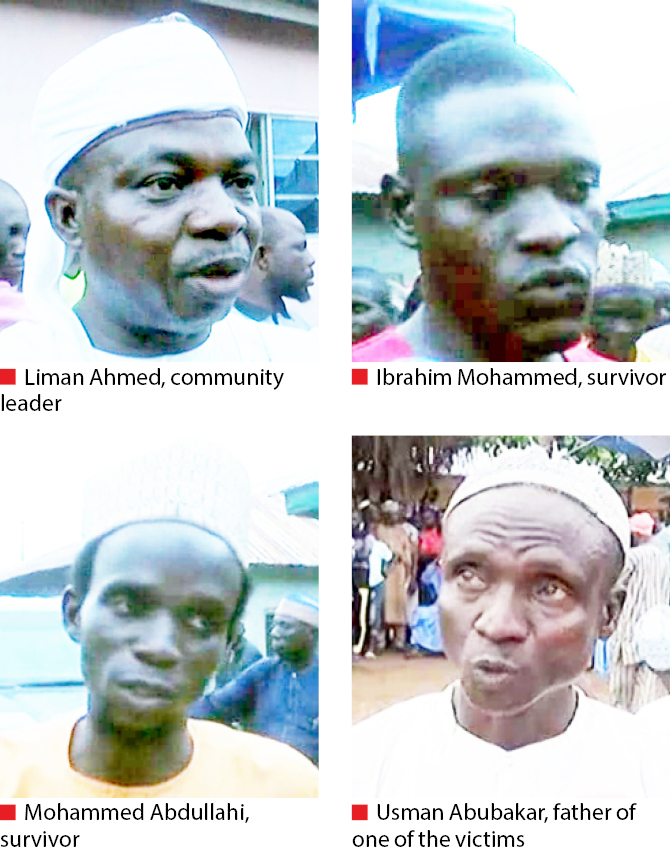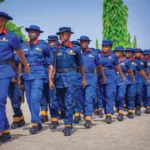Last week Tuesday, the country woke up to the sad news of a boat accident that claimed 108 lives, the majority of whom were women and children in Patigi Local Government Area of Kwara State. In this report, Daily Trust Saturday speaks with survivors and relations of the victims who x-rayed their experiences, circumstances that led to the tragedy and steps taken so far by relevant authorities, among others.
Tales of woes
It has been tales of shock, regret and lamentation in the affected villages of Egboti, Kpada, Ebu and Dzakan in Patigi Local Government Area of Kwara State since the boat incident that occurred in the wee hours of last week Tuesday made global headlines.
Residents, days after the incident, still found it difficult to come to terms with the reality of the situation. Many bodies are still missing.
On Saturday, a man identified as the groom of the wedding the victims attended was shown alone in the river looking into the horizon on Channels Television.
The station said “he declined all efforts to speak with him on the matter” during recovery efforts by the joint rescue team.
Usman Abubakar, the father of one of the victims of the ill-fated boat trip could only describe the effect of the tragedy on his family with one word, “devastating”.
For the farmer, his dream to see his children grow up to ease the burden on the family had only started materialising when it suddenly reached an abrupt end during the trip.
The victim, a 15-year-old, perished in the incident that has attracted contrasting narratives and reactions.
According to him, “My son is a very hardworking person who has been assisting the family from his tailoring business. But now…we are very devastated,” he submitted.
Another survivor and housewife, Aisha Muhammed, said she lost three daughters who were preparing for marriage.
“I lost three daughters who were preparing for marriage. They drowned after the boat capsized. I don’t just know what to say but this is a very terrible loss for my family,” she added.
On his part, Mr Ibrahim Muhammed popularly known as Danjuma was still wearing heavy eyes when speaking with our correspondent on Friday.
According to him, “I lost my wife, a son and a sister with her four children. After the boat sank, I was swimming to the river bank and I saw two of my children swimming behind me. I threw a jerrycan to one of them who cannot swim properly to hold on to and told his elder brother to continue to swim but watched by wife and son perish.”
Muhammed Abubakar, another survivor, said he also “lost his wife and two children—a boy and girl, in the incident but was only able to save himself and a son after they swam to the river bank.
According to a police report, the casualties include 61 from Ebu, 38 from Dzakan, four from Kpada and three from Kogi State, making 106 while 144 were rescued.
How they drowned
Although the initial police report on the incident suggested that one part of the boat by the engine side collapsed from where water penetrated, it was gathered that the engine of the boat went off less than half kilometre into the trip.
According to Ibrahim Mohammed, “the incident occurred after the machine of the boat malfunctioned and suddenly stopped the boat on the water. It was while trying to restart it that it collapsed and later capsized.”
Survival of the fittest
Many of the survivors, majority of whom are males, made it to the river banks while others held on to the trees inside the river for safety. Some of the children were given jerrycans to stay afloat. Others had the grace of God to thank. Muhammed Abdullahi, captured it thus. “We were about two minutes into the journey when suddenly the boat collapsed and water started entering. At this moment, there was the decision that those of us who could swim should jump into the river and the boat capsized. It was a very terrible experience and scenario watching people, especially females, mothers and children drowning while you find yourself helpless.
“It was God that helped me to a tree which I climbed to safety.”
Dead bodies “controversy”
On Friday evening, the rescue team recovered the wreckage of the boat from the river after several hours backed by about 50 men from the communities supported by three boats. However, many of the dead bodies were still missing.
Locals told Daily Trust Saturday that many of the corpses were buried by the riverside and others floated to neighbouring states of Kogi and Niger. Some of them said their attention was drawn to the development by the indigenous people of the neighbouring villages.
Speaking on the issue, a former chairman of Patigi LGA, Alhaji Usman Mohammed Ndako, said “some of the corpses were buried along the river side.
“This is not a ceremony. We are talking about 106 people and vehicles cannot go there, especially in the rainy season. In my village in Kpada, we lost 4 people; some households lost 8, 10, 11 and more in other villages,” he noted.
Farming concern
“And what is clear now is that this will affect farming activities in those places because they are predominantly farmers and fishermen,” Ndako added.
It was also gathered that some of the villagers don’t subscribe to burying people that died by drowning inside the community because of the belief that such communities will be submerged by water.
Mrs Elizabeth Lade, a rice farmer in Patigi said “although it was not clear whether there was a suggestion to wait till the next morning before embarking on the trip, the norm is to leave for their various destinations after marriage ceremonies.
“The villages are close by road but not accessible. This is not the first time a boat will be used to transport such a high number of people. They have been used to it and even when there are no passengers, it can transport 350 bags of guinea corn. But the lack of access roads necessitated the boat trip because of the large number of women and children,” she added.
Not a single life jacket
Ibrahim Mohammed, a survivor, said the “casualties would have been less but some of the women who could swim were trying to save their children, sometimes four at a time in desperation and ended up losing them all. There are a lot of victims who were good swimmers, he said.
He added that “Not a single one of us wore life jackets,” and called on the government to look into the issue.
Inaccessible roads
A community leader in Patigi, Liman Umar Ahmed, said the communities are still mourning.
He said “The canoe was overloaded but if there were access roads, they wouldn’t have plied the river because the communities are closer by road. And that is why we are calling on government to link these communities by roads to minimize such occurrences in the future,” he submitted.
Government/Authorities Speak
Chairman, Transition Implementation Committee of Patigi Local Government Council, Mohammed Ibrahim Liman, said “rescue operation had been concluded and the survivors, mostly women and children, reunited with their families after medical attention.
The Area Manager, National Inland Waterways Authority, in charge of Niger-Kwara areas, Akapo Adeboye, said “This is a very sad situation that is avoidable. What led to it was overloading of the boat by the operators who wanted to make more money. We have educated them through messages in English, Hausa and other languages spoken in this area, but they won’t listen.
“We even set up a safety unit and when we apprehend any defaulter, we sanction them through payment of fines up to N100,000.
“Despite all our efforts at making sure that they comply with the safety standards that they must have life jackets, lifebuoys and other safety equipment on board, many of the operators just choose the easiest way out by travelling at night just because they want to avoid our monitoring and safety patrol,” he added.
N1.6bn spent on life jackets – HYPPADEC
Reacting to the issue, Managing Director, Hydroelectric Power Producing Areas Development Commission (HYPPADEC), Mallam Abubakar Sadiq Yelwa, has called for the enactment of laws for mandatory use of life jackets and avoidance of night travels by residents of riverine communities in the country.
Yelwa, represented by the Director of Community in the commission, Dr Mahmoud Umar, during a public function in Ilọrin after the incident, said over N1.6 billion was spent on distribution of life jackets to dwellers of riverine areas last year.
“More lives would have been saved if the mishap had happened during the day and if the victims had put on the life jackets. A life jacket can keep a victim afloat for at least seven hours and help would have come from villagers within that period.
“I want to call on relevant authorities to legislate a law that will make the use of life jackets compulsory for boat passengers and as well restrain the boat operators from operating at night,” he said.
Violators will be punished – Tinubu, AbdulRazaq
During his condolence visit to the affected families on Wednesday, the Kwara State Governor, Abdulrahman Abdulrazaq, announced safety measures to be taken by the government on water travels in the state.
He however, hinted that there will be consequences for violators moving forward.
He said the “government will send legislation to the parliament that will impose punishments and fines for violations of the safety protocol.
“Our immediate step is to deliver at least 1,000 life jackets to support safe travels on water in the area.
“The government will design and roll out some statewide standard operating procedures for water travels to cover issues of boat serviceability, speed and loading limits and wearing of life jackets by all passengers.
“This will be the new irreducible minimum,” the governor who said a team will be raised to study Lagos on regulations declared. President Bola Ahmed Tinubu has also echoed the governor on sanctioning violators.
Condolences
President Tinubu; former Senate President, Dr Bukola Saraki; Speaker of the Kwara House of Assembly, Engr Yakubu Danladi-Salihu; Emir of Ilorin, Dr Ibrahim Sulu Gambari; Governor Dapo Abiodun of Ogun State and former governor of Anambra State, Peter Obi, among others, have also condoled the families of the victims, the Etsu Patigi, Alhaji Ibrahim Umar Bologi II and the people of the communities, describing the incident as tragic and unfortunate.

 Join Daily Trust WhatsApp Community For Quick Access To News and Happenings Around You.
Join Daily Trust WhatsApp Community For Quick Access To News and Happenings Around You.
